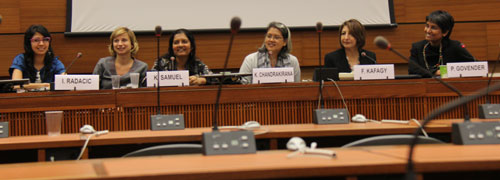Report on discrimination against women in public and political life with a focus on political transition
Issued by
Working Group on discrimination against women and girls
Published
19 April 2013
Issued by
Working Group on discrimination against women and girls
Published
19 April 2013
Issued by Special Procedures
Subjects
Public participation, Discrimination, Women
Symbol Number
A/HRC/23/50
Summary
This first thematic report of the Working Group recorded achievements in women’s political representation and articulated the further challenges to women’s equal, full and effective participation in political and public life in the context of democracy and human rights, including in times of political transition.
The past decades have been marked, variously in different regions and States, by the dismantling of long-standing totalitarian regimes, democratization and the emergence of new forms of authoritarianism. This period has also witnessed armed conflicts both between and within States, the creation of refugee populations and international involvement in conflict resolution and peacebuilding. Technological leaps in the field of information and communications, particularly the Internet, have created a new public and political space, with revolutionary impact on the development and the exercise of human rights, allowing new forms of political expression and mobilization, and facilitating political communication and organization for men and women globally.
This first thematic report of the Working Group recorded achievements in women’s political representation and articulated the further challenges to women’s equal, full and effective participation in political and public life in the context of democracy and human rights, including in times of political transition. The Working Group identified critical issues to address in eliminating the structural and social underpinnings of gender discrimination in political and public life and presented a framework to eliminate discrimination in law, with some examples of good practices. Despite decades of efforts, the Working Group noted that women in every part of the world continued to be largely marginalized from the political sphere.
The report contains a number of recommendations to support States in developing and implementing comprehensive measures, such as:
Side Event

“Women’s rights and human rights advocates making presentations at the joint Side event
during the 23rd session of the Human Rights Council”.
On 4 June 2013, the Working Group on discrimination against women in law and in practice and Development Alternatives with Women for a New Era (DAWN), convened a joint side event comprising of a panel of leading women’s rights and human rights advocates, to deepen discussions on the issues examined in the first thematic report of the Working Group. For further details, see the concept note.
Questionnaire
To inform its thematic report, the Working Group on the issue of discrimination against women and girls circulated a questionnaire on the implementation of law and policy and effective strategies to eliminate discrimination against women in the political and public life and particularly during political transitions. Different stakeholders, including Members States, civil society organizations and other actors sent responses.Access the questionnaire (English | Français | Español) and the inputs below.
Other written contributions
Background papers*
Regional
Global
*Background papers, submitted to the Working Group by different parties, help inform the Working Group’s thematic reports. These papers do not necessarily reflect the views of the Working Group.